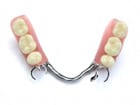Surbiton dentists fit dental bridges to restore lost teeth
 If you have lost a tooth or some of your teeth it is vital that you get them replaced somehow so that your mouth is able to function as normal. Your mouth is finely tuned composite of all of its parts and it relies on having a functioning set of teeth. If you don’t have a full set of teeth, eating, drinking and even talking can be made that bit more difficult.
If you have lost a tooth or some of your teeth it is vital that you get them replaced somehow so that your mouth is able to function as normal. Your mouth is finely tuned composite of all of its parts and it relies on having a functioning set of teeth. If you don’t have a full set of teeth, eating, drinking and even talking can be made that bit more difficult.
You might have lost teeth as result of an accident or because of dental decay or gum disease. There are a number of options for replacement such as dental implants or a set of dentures. Dental bridge work is popular because unlike dental implants, it is not invasive and, unlike dentures, it is a permanent solution and your replacement teeth can be treated like normal teeth.
Dental bridge work basically involves anchoring replacement teeth to teeth that are already in place in your mouth using a strong, dental resin. There are three main types of dental bridge. The first and most common is the traditional or fixed bridge. This is where the replacement tooth is anchored on both sides to healthy teeth. This is a very stable way of doing a bridge but it relies on there being two healthy teeth on either side of the gap.
In the case of a cantilever bridge, the replacement tooth is only anchored on one side, possibly because the tooth on the other side is not deemed to be strong enough. Maryland-bonded or resin-bonded bridge work is carried out if the resin needs to be concealed to preserve aesthetic appeal. This might be appropriate at the front of the mouth.
If you need a tooth or teeth replacing, talk to your Surbiton dentist. They will have all the information you need about dental bridges.





